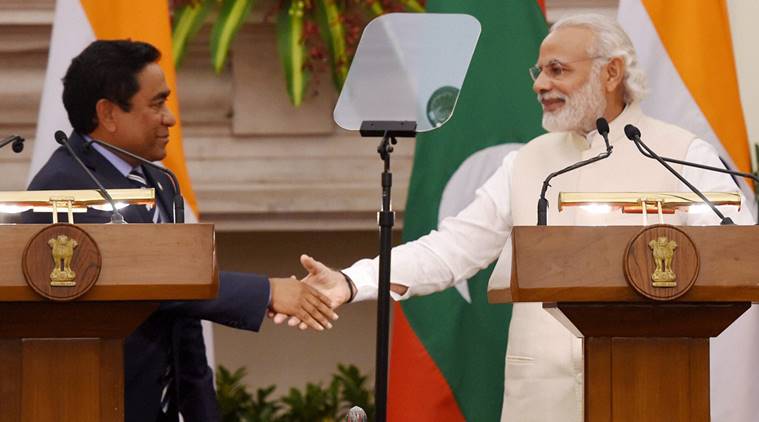FOR THE first since the Maldives government imposed emergency and arrested a former president and the Supreme Court chief justice 10 days ago, triggering alarm bells in the region and the West, the Indian Ambassador in Male Thursday met a senior official of the island nation to discuss “each other’s position and concerns”.
The official meeting between Akhilesh Mishra and Foreign Secretary Ahmed Sareer came a week after India had expressed its inability to host a special envoy from the Maldives.

Sources told The Indian Express that Mishra and Sareer reiterated “their commitment to strengthen relations between the Maldives and India”.
Sareer told the Indian envoy that detained former president Maumoon Abdul Gayoom, chief justice Abdulla Saeed and another judge, Ali Hameed, are in “good health”, with access to doctors and medicines, said sources. Mishra was informed that Gayoom has been moved from the Dhoonidhoo detention centre to Maafushi prison.
The Maldives Foreign Secretary also conveyed that there was “no infringement of rights” of those detained, and that prison authorities and police were “treating them well within the letter and spirit of the law”, said sources.
“The discussions were frank and candid but there were no assurances made or given by either side. It was more about understanding each other’s position and concerns,” sources said. However, they said, the possibility of visits by envoys was explored and discussed during the meeting.
The meeting came amid calls from the Maldives Opposition for Indian intervention. The Indian side has refrained from responding to this demand, including military intervention.
Story continues below this ad
Earlier this week, the Maldives government had “noted with concern” that calls for and encouragement of Indian military intervention and action in the Maldives had been made by some Maldivians. It further said that at no time was a request for military intervention made from their side — drawing a crucial difference between the current situation and the one in 1988 when the Gayoom government sought Indian intervention.
Sources said the Maldives government’s statement was directed at India, although New Delhi has chosen to remain silent on the issue so far.
So far, India has made two official statements on the ongoing crisis in Maldives. On February 2, New Delhi called on the Maldives government to abide by its Supreme Court’s ruling ordering the release of political prisoners and reinstatement of 12 disqualified parliamentarians. Later, India said that it was “disturbed” by the imposition of a state of emergency followed by the arrest of Gayoom and Saeed.
India also issued a travel advisory advising its citizens to avoid all non-essential travel to Maldives.
Story continues below this ad
Last week, Maldives had sought to send a special envoy to India but New Delhi conveyed that the dates were not suitable as the top political leadership was out of the country. Maldives had sent special envoys to China, Pakistan and Saudi Arabia.
On Thursday, in another diplomatic signal, Maldives President Abdulla Yameen sent messages of felicitation to Chinese President Xi Jinping and Chinese Premier Li Keqiang, on the occasion of the Chinese New Year.
“As we embark on a new year with renewed commitment for fruitful collaboration between our two countries, I wish to thank Your Excellency, for the diligent attention to the development needs of the Maldives, and the feats that we have accomplished in the past year. Please accept my best wishes for Your Excellency’s health and well-being, and my profound aspiration to further bolster the relations towards greater benefits for our peoples,” his letter said.

 Maldives President Abdulla Yameen with Prime Minister Narendra Modi. (File photo)
Maldives President Abdulla Yameen with Prime Minister Narendra Modi. (File photo)






